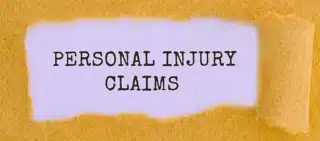
Overview of the Personal Injury Claim Process in Illinois No one expects to suffer an injury or get involved in...


Illinois was one of the states that initially capped damages in personal injury cases. A 2010 court ruling, however, overturned that law, terming it unconstitutional. Since then, Illinois does not have statutes limiting the amount of recoverable damages in personal injury claims. The court ruling on damage caps was a significant legal move with crucial details that can impact your compensation. Consulting an Illinois personal injury attorney on matters regarding damage limits can help you understand what to expect after a successful personal injury claim process.
Personal injury lawyers at Strong Law Offices in Bloomington can answer questions regarding recoverable damages in your claim. Our lawyers will provide you with the legal guidance and representation you need to make an informed decision and receive maximum compensation. Call 309-393-2928 to set up a free consultation with one of our seasoned lawyers.

Illinois does not have laws capping damages in successful personal injury claims. A damage cap is a legal statute that limits the compensation an accident victim can receive for the resulting injuries and losses.
The three main types of damages recoverable in a personal injury case include:
Economic damages, or special damages, are the tangible or quantifiable aspects of your losses after an accident. They include:
Non-economic (general) damages refer to the intangible aspects of your losses in a personal injury case. Examples of non-economic damages include pain and suffering, loss of consortium, emotional trauma and distress, and long-term disfigurement due to accident-related injuries. They are losses or injuries that one can't put a monetary value on or easily calculate. A lawyer can, however, determine the value of these damages and help you sue for emotional distress in a personal injury case.
Punitive damages, or exemplary damages, are financial awards that some injury victims receive on top of their economic and non-economic damages. These damages are not intended to compensate eligible injury victims for injuries and resulting losses. Instead, they act as a punishment to the defendant for extremely negligent conduct. They are also meant to discourage others from similar conduct.
Only a few personal injury cases meet the conditions of punitive damages award in Illinois. These conditions include:
The conduct or actions of the defendant must surpass basic negligence. You must demonstrate that the defendant intended to harm you or acted with total disregard for your safety.
The burden of proving punitive damages is higher than economic and non-economic damages. You must present clear and irrefutable evidence of the defendant’s egregious behavior.
The court will consider the overall implications of awarding punitive damages. It will then strive to balance between the effect on the defendant and the need to discourage similar behavior in the future.
While the state doesn't have statutes limiting the damages a personal injury claimant receives, various legal details in Illinois law might impact your compensation. The following are the legal implications of Illinois' “no cap” ruling on various damages in personal injury cases.
Economic damages are typically clear and easy to establish, as they are based on financial statements, receipts, medical bills, and remuneration-related documents. Therefore, it's only morally and constitutionally upright to compensate an accident victim for the full scope of their financial losses, regardless of the amount.
More dangerous incidents, such as truck accident cases, have significant economic damages. Illinois doesn't place caps on economic damages. Once calculated, the financial damages are awarded regardless of the amount. For example, if your damages based on financial documents are valued at $55,000, the liable party must fully compensate you the $55,000.
In 2005, Illinois enacted a law that places caps on non-economic damages in medical malpractice cases. However, in 2010, a Supreme Court ruling overturned the Illinois cap on medical malpractice, terming it as unconstitutional. Since then, the state has not had statutes limiting compensation amounts in personal injury claims or medical malpractice.
The authority to decide how much a plaintiff recovers in non-economic damages in medical malpractice claims lies with the court. The court considers the unique facts of the case and evidence and arguments presented when determining how much non-economic damages to award.
The no-cap rule on non-economic damages is a crucial reprieve for victims who endure long-term emotional and psychological effects due to the accident. For example, a school bus accident or commercial truck crash commonly leaves victims with severe injuries that lead to long-term disability and disfigurement. The change in their lives and how they experienced it can lead to great emotional pain for years. Considering the emotional toll, the jury can award any amount as compensation, depending on the magnitude of the injuries.
Does Illinois cap punitive damages? There's no hard cap on punitive damages. As previously stated, the purpose of punitive damages is to punish the defendant and foreshadow what awaits anyone who indulges in such negligent actions. For this reason, punitive damages are significantly higher than compensatory damages. Some punitive damages range from hundreds of thousands to millions of dollars.
Although there's no cap on punitive damages, the state creates policies or laws to ensure these damages are reasonable and proportional to the case. Punitive damages aren't awarded in medical malpractice claims, even when the malpractice leads to death.
Wrongful death claims also have substantial damages awarded to the surviving family members or the decedent's estate. Until recently, Illinois had a law barring the recovery of punitive damages in wrongful death cases, but that changed.
The state passed legislation that abolished the restrictions placed on wrongful death punitive damages. As of August 2023, the decedent's estate or family can receive punitive damages if the death occurred because of another party's malicious intent or gross negligence.
The change in punitive damage caps is especially crucial in a wrongful death lawsuit that involves exposure to toxic substances. For example, you can sue your deceased loved one’s employer if the employer's negligence exposed your loved one to a radioactive substance or asbestos that caused his or her illness and death.
Earlier, such at-fault employers delayed the legal proceedings in work-related claims until the victim died of their illness, thus eliminating the need to consider punitive damages. The new legislation filled the legal gap, and they can no longer resort to such practices. Now, a wrongful death claimant can receive punitive damages.
Accident victims often incur medical bills and property damages. It's normal for them to ask: "How long do personal injury cases take to settle?”
There's no standard timeline for settling personal injury claims. Still, there are average timelines for these cases based on the circumstances and legal complexity.
Besides case complexity, other factors that impact the length of a personal injury claim include severity of injuries and length of treatment, insurer cooperation and reasonableness, liability issues, and trial vs. pre-trial settlement approach.
Working with an Illinois personal injury attorney after getting injured in an accident due to another person’s fault can help protect your right to pursue compensation. Your lawyer has in-depth legal knowledge and experience to answer any question you may have about the damage caps in your claim.
While the state may have no hard limits on the amount of recoverable damages in your claim, there's no guarantee that you'll get a fair settlement. That’s why you should have a personal injury lawyer in your corner. The lawyer will do the following for you:
Illinois may not have damage caps on compensations in injury claims, but laws and legal details may affect how you handle your case and the damages you can recover. A personal injury lawyer knows these laws and can explain how they will impact your case.
For instance, Illinois follows a modified comparative negligence law. This law disqualifies you from recovering damages if you were more than 50% liable for your injuries. What's more, the compensation amount entitled to you is reduced by your percentage liability.
The defense counsel will likely use this law to shift blame and lowball the settlement. Your lawyer can help you navigate this issue by doing a thorough investigation to prove the defendant’s liability and reduce your liability or eliminate it. The lawyer can also ensure your claim’s value is accurate by accounting for all the recoverable damages.
Insurance companies are usually reluctant and uncooperative during settlement negotiations. They hire aggressive attorneys and insurance adjusters who often work for their interests – to reduce the insurance payout or find ways to shift blame so they can deny the claim altogether.
Your lawyer will handle the correspondence, interactions, and negotiations with insurance companies and other parties. The lawyer will also work closely with medical professionals and expert witnesses who can provide reliable testimonies to help calculate and prove your losses.
Many accident victims get confused about when to hire a personal injury lawyer. It is a good practice to hire a lawyer who practices in your state soon after a personal injury accident. Doing that allows your lawyer to investigate your case, gather fresh and compelling evidence, and help you file a claim within the statute of limitations.
Your lawyer will move to court to have the case heard and determined by a judge or jury if the insurance company denies your claim or refuses to offer an acceptable settlement. The lawyer will present strong and convincing evidence to substantiate the defendant’s negligence and prove your injuries and losses. The lawyer will also counter evidence and arguments presented by the other side.
Your lawyer will follow up with the insurance company to ensure you receive your money on time and as per the settlement agreement or court verdict.
The cost of legal representation is a serious concern for most personal injury victims. Fortunately, most lawyers in Illinois handle personal injury cases on a contingency fee arrangement. The lawyer only gets paid after securing a payout for you.At Strong Law Offices Bloomington, we have helped personal injury victims in Peoria, Bloomington, Springfield, Chicago, and throughout Illinois hold liable parties accountable and secure compensation. Contact us if you were hurt or lost a loved one due to another party’s negligence. We offer free, no-obligation consultation. We also do not charge legal fees unless we secure a payout for you through settlement negotiations or a lawsuit process.

Overview of the Personal Injury Claim Process in Illinois No one expects to suffer an injury or get involved in...

Exploring Caps on Damages in Illinois Personal Injury Cases Illinois does not have laws capping damages in successful personal injury...

For one of the top Peoria law firms to manage your case, contact Strong Law Offices at (309) 688-5297. Top...